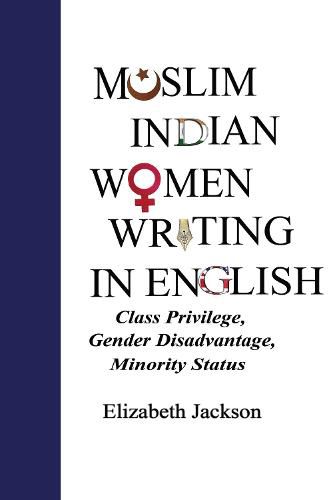Readings Newsletter
Become a Readings Member to make your shopping experience even easier.
Sign in or sign up for free!
You’re not far away from qualifying for FREE standard shipping within Australia
You’ve qualified for FREE standard shipping within Australia
The cart is loading…






This title is printed to order. This book may have been self-published. If so, we cannot guarantee the quality of the content. In the main most books will have gone through the editing process however some may not. We therefore suggest that you be aware of this before ordering this book. If in doubt check either the author or publisher’s details as we are unable to accept any returns unless they are faulty. Please contact us if you have any questions.
In Muslim Indian Women Writing in English: Class Privilege, Gender Disadvantage, Minority Status, Dr. Elizabeth Jackson conducts a study of the literary fiction of the four best-known Muslim Indian women writing in English during the postcolonial period: Attia Hosain (1913-1998), Zeenuth Futehally (1904-1992), Shama Futehally (no relation, 1952-2004), and Samina Ali (b. 1969). As elite Muslim women in India, the literary vision of these authors is influenced by their paradoxical position of class privilege, gender disadvantage, and minority status. Accordingly, there are recurring thematic concerns central to the fiction of all four writers, each of which forms a chapter in the book: Religion and Communal Identity,
Marriage and Sexuality,
Gender and Social Class, and Responding to Patriarchy. The first chapter, Form and Narrative Strategy, provides an initial framework by examining the literary techniques of each writer.
Much has been written about literature in English by Indian women, about Muslim literature in general, about the Muslim minority in India, and about Muslim women all over the world. However, until now there has been no major academic study of literature in English by Muslim Indian women. Aimed at researchers, students, and general readers, this book aims to fill that gap in the critical scholarship.
$9.00 standard shipping within Australia
FREE standard shipping within Australia for orders over $100.00
Express & International shipping calculated at checkout
This title is printed to order. This book may have been self-published. If so, we cannot guarantee the quality of the content. In the main most books will have gone through the editing process however some may not. We therefore suggest that you be aware of this before ordering this book. If in doubt check either the author or publisher’s details as we are unable to accept any returns unless they are faulty. Please contact us if you have any questions.
In Muslim Indian Women Writing in English: Class Privilege, Gender Disadvantage, Minority Status, Dr. Elizabeth Jackson conducts a study of the literary fiction of the four best-known Muslim Indian women writing in English during the postcolonial period: Attia Hosain (1913-1998), Zeenuth Futehally (1904-1992), Shama Futehally (no relation, 1952-2004), and Samina Ali (b. 1969). As elite Muslim women in India, the literary vision of these authors is influenced by their paradoxical position of class privilege, gender disadvantage, and minority status. Accordingly, there are recurring thematic concerns central to the fiction of all four writers, each of which forms a chapter in the book: Religion and Communal Identity,
Marriage and Sexuality,
Gender and Social Class, and Responding to Patriarchy. The first chapter, Form and Narrative Strategy, provides an initial framework by examining the literary techniques of each writer.
Much has been written about literature in English by Indian women, about Muslim literature in general, about the Muslim minority in India, and about Muslim women all over the world. However, until now there has been no major academic study of literature in English by Muslim Indian women. Aimed at researchers, students, and general readers, this book aims to fill that gap in the critical scholarship.